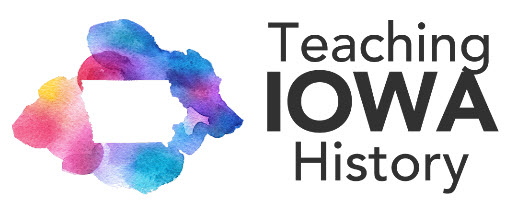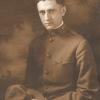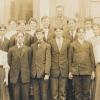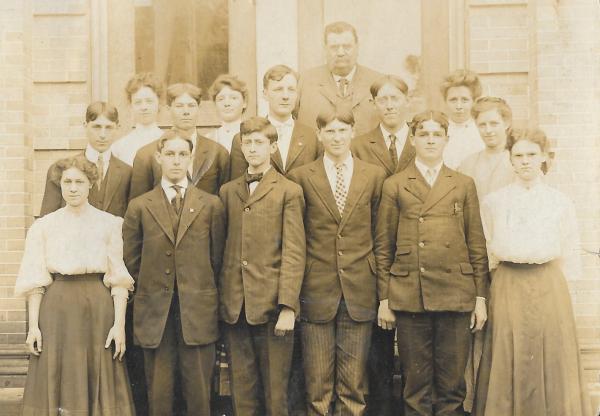Herbert Hoover
| Grade | 9th -12th Grades | Class | World History | Length of Lesson |
| Lesson Title | Herbert Hoover |
| Unit Title | |
| Unit Compelling Question | |
| Historical Context: The individual photo, from the collection of the Dexter Historical Museum, shows Iowan Conger Reynolds in his military uniform. The group photo, from the same collection shows the 1908 graduating class of Dexter High School, Dexter, Iowa. Conger Reynolds is third from the left in the front row. Born on a farm in Dallas County, Iowa, on March 23, 1891, Conger Reynolds grew up in the small town of Dexter, Iowa. He attended the University of Iowa where he graduated Phi Beta Kappa in 1912. His first job was as a reporter with the Des Moines Register and Leader. In 1915, he became publicity director at the University of Iowa, and also taught journalism. Reynolds registered for the draft for World War I on June 5th, 1917 in Iowa City, Iowa. He indicated that he was born on March 23, 1891 in Dexter, Iowa, and was serving in Candidate Officers Training at Fort Snelling, Minnesota. He had been a cadet for two years at University of Iowa. During the war he served as an intelligence officer in France. After the war, he remained in France as managing editor of the Chicago Tribune, Paris edition. In 1922, he was appointed vice-consul to Halifax, Nova Scotia for two years, then as vice-consul and later consul in Stuttgart, Germany. While serving as a consuls, Reynolds specialized in trade promotion. In 1929, Reynolds became the director of public relations for the Standard Oil Company, from which he retired in 1955. Moving to Washington, DC, Reynolds joined the US Information Agency as director of the Office of Private Cooperation. There he worked with the Eisenhower administration to launch the People-to-People program which was designed to promote international understanding. He worked in this capacity until he retired in 1961. Conger Reynolds died in 1971. ### Few Presidents have had been loved or reviled as much as Herbert Hoover. From a hero who survived a Chinese rebellion, a very successful mining engineer, a leader of the evacuation of Americans from WWI Europe, an administer revered for his food distribution programs that saved millions from starvation in postwar Europe, an aggressive Cabinet secretary who promoted efficiency in American business, and finally to President of the United States, Hoover exemplified the American dream of an orphan who achieved fortune and fame through his remarkable career. And from this pinnacle of adulation, he became the symbol of callous disregard for the suffering Americans when the Great Depression came crashing down on the United States eight months into his Presidency. Hoover was very much a transitional figure in American history. He was not a career politician. President Woodrow Wilson, a Democrat, appointed him to take over distribution of food relief in the bleak years after WWI while European farmers got their fields back into production. Hoover built on his reputation as an efficient administrator to coordinate supplies with demands to keep hungry children from starvation. In Europe, he was revered. When Warren Harding was elected President in 1920, he appointed Hoover to be his Secretary of Commerce, a post Hoover used to bring American industries together to voluntarily agree on standards and practices that would make U.S. industries more efficient and profitable. He did not want government to force cooperation. He used the government to be the source that brought agents into discussions to find their best solutions. In 1928, Hoover ran for President. His most serious rival was Frank Lowden from Illinois who was supported by Republicans representing Midwestern rural interests. Hoover had the firm support of financial and manufacturing regions, and he easily won the nomination. His opponent in the general election was Gov. Al Smith, a New York Catholic. No Catholic had ever won the Presidency, and Protestants strongly supported Hoover. In October of 1929, there was a very sharp, sudden drop in the New York stock market, creating a panic among investors. Underlying causes included a decade-long depression in the farming sector brought on by farm surpluses and resulting low prices for a large segment of the population. Four years in the future, the New Deal would directly involve the Federal government in the farm economy by paying farmers to take lands out of production to reduce the surplus, but Hoover's vision of the proper role of the U.S government could never accept such radical programs. When people had no money to buy automobiles or appliances or clothes or supplies, factories quit producing them and laid off more workers, further decreasing the buying power of the public. Throughout his Presidency, the situation became worse and worse, finally reaching a point where some thought there would be revolutions. (There were actually some small rebellions across Iowa where farmers refused to allow courts to force farms into bankruptcy.) Hoover was blamed for the Depression. Camps of unemployed migrants became known as Hoovervilles. The newspapers they used to wrap themselves in the winter were called Hoover Blankets. Hoover was soundly defeated in the 1932 election by Franklin D. Roosevelt, and he retired for a time from active public life. His reputation began to rebound in later years. He headed a commission to recommend some restructuring of a Federal government that had grown rapidly and often haphazardly. His achievements in food distribution in Europe were never forgotten by the people he had saved from starvation. The Hoover Library and Museum in his hometown of West Branch, Iowa, draws thousands of people each year to see this most remarkable orphan who rose to the highest office in the land. |
|
| Lesson Supporting Question | |
| Lesson Overview | Students will be able to describe who Herbert Hoover is and where he came from in Iowa. Students will be able to analyze the consequences of the financial decisions that Hoover made and how that impacted the Great Depression. Students will be able to empathize with someone who was living in the day, either if they were in favor of Herbert Hoover or those who are suffering from the Great Depression. Primary concepts: beginning of economics, the Great Depression, Herbert Hoover, the only president from Iowa, and how the Great Depression impacted his presidency. Here the class will discuss the economic struggle that arose because of the Great Depression and how the only president born in Iowa would handle this situation. The Great Depression would not only impact the United States economy, but it would also impact the World’s economy and history and therefore we will cover the presidential help during the time period. |
| Primary Sources Used |
|
| Resources Needed | https://docs.google.com/presentation/d/1keuIXLD6DYdiGXUNmjllIPO-LUuxVkfos72dQE9A5IQ/edit#slide=id.g35ed75ccf_022 |
| Standard | |
| Lesson Target | |
| Lesson Themes | Cultural Events, Services, Disaster and Crisis |
|
| Formative Assessment (How will you use the formative assessments to monitor and inform instruction?) |
|
| Summative Assessment (How does the lesson connect to planned summative assessment(s)?) |
Students will create three short diary entries pretending to be a citizen during the time of Herbert Hoover. Each of these journal entries should be about a page. The students can choose to be a American citizen that is in support of Herbert Hoover or someone who is in the Great Depression and struggling with the Great Depression and are a bit more critical of Herbert Hoover. |
| Author | Courtney Post | Created | Last Edited | ||||
| Reviewer: Dr. Lisa Millsaps, University of Northern Iowa | |||||||
| Lesson Plan Development Notes: Teaching Methods, University of Northern Iowa, Fall 2018 | |||||||




